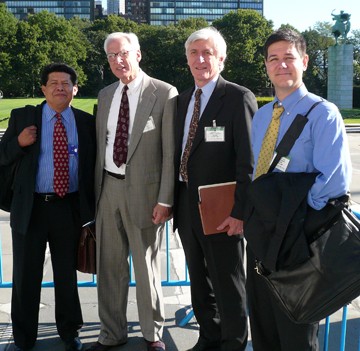International law and legal procedures offer a number of opportunities for creative advocacy that aims to change existing, unjust legal doctrines. There are two upcoming advocacy opportunities at the United Nations and the Organization of American States: the UN Permanent Forum on Indigenous Issues and the OAS Working Group to Prepare the Draft American Declaration on the Rights of Indigenous Peoples.
|
|
The Permanent Forum on Indigenous Issues is the only international body in the United Nations having indigenous members. The Permanent Forum is the highest level body in which indigenous leaders can participate without NGO credentials, and the Permanent Forum has a mandate to consider the full range of issues affecting indigenous peoples, not just human rights. The next Permanent Forum will take place in New York on April 21 - May 2, 2008.
The Organization of American States (OAS) is working to develop and adopt an American Declaration on the Rights of Indigenous Peoples. The draft American Declaration will be limited in its scope to indigenous peoples in the Americas, and will be monitored by the Inter-American Commission on Human Rights. Participation in the OAS process to develop the text of the American Declaration is open to indigenous representatives. The next meeting to debate the draft American Declaration will take place on April 14-18, 2008 in Washington, D.C.
For more information about the opportunities discussed above, as well as other advocacy opportunities available, please contact Lucy R. Simpson at 406.449.2006; [email protected].
LINKS
Download the full memorandum on how tribes can ensure their human rights are recognized and protected
